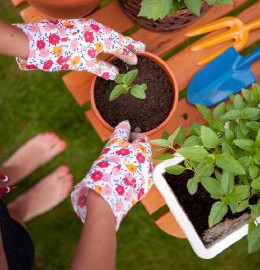The following article will take you through some of the natural insecticides for vegetable gardens. If you've ever had this problem, the following article can help you out with some remedies.

Bugged by bugs? Irritated with the constant swarms and colonies of a countless pesky insects making your vegetable garden their playground? Munching, chewing up, and destroying that which you have created with such care and patience? Are you going to sit back and watch your garden be a prey to the likes of those pests, or are you going to take the required steps for effective pest control? I'm guessing you'll go with the pest control option and will end up using pesticides for the same. Might I suggest you go in for some natural insecticides in the vegetable garden instead? Why pour chemicals over your plants when you can deal with the insects without harming them?
Natural Insecticides for Gardens
Depending on the kind of vegetables you'll be growing in your vegetable garden, the methods of getting rid of the pests will change. And since that could turn out to be a never-ending topic, let's tackle this a little differently. Given below are some insecticides that will work for any kind of vegetable garden. So take note and start making the necessary arrangements.
Tomato Leaves: Take some tomato leaves and add cornstarch (1 tbs.) and water (3-5 pints) and blend well in the juicer. Now, strain the liquid and transfer the contents into a spray bottle. Spray around the plants for getting rid of the ants and other bugs that have made house in the vegetable garden.
Vegetable Oil Soap: Take any mild liquid soap and measure out about ½ cup of the same. Add vegetable oil (2 cups) into the liquid soap and mix together in a blender. To a tablespoon of this mixture, add 1 quart of water. Use this formula to cover both sides of the leaves of the plant(s). Make sure that you do not use a stronger formula 'cause it'll be harmful for your plants. And even though this is a tedious process, it really works.
Garlic Spray: Take about 4 garlic cloves and chop them up. Add them to a liter of water and let this mixture sit through the entire night. You can boil garlic cloves in a cup of paraffin wax as well. Now, add some soap flakes to the same by grating about a level full of any mild soap bar in it. Mix the liquid well and transfer into a spray bottle. Spray over the leaves.
The other alternative to this is to add hot chillies or onions to the same. Garlic has been known to get rid of spider mites, rabbits, mosquitoes, and several other garden pests. This has been seen to work wonders as a natural insecticide for basil and other plants.
Mixed Recipe: Mix 3 tbs. of onion and garlic juice, 1 tb. of Tabasco sauce, 3 tbs. skim milk, and 2 tbs. baby shampoo in 1 gallon of water. Mix all ingredients well and spray all over the plants. Repeat every 10 days.
Neem Oil: Neem leaves are extremely bitter to taste and are usually used as a natural insecticide. Oil made from these leaves also makes for one of the most effective insecticides. Just dab a cotton ball into the neem oil and spread over the plants. Neem oil as an insecticide will not only repel the insects but also discourage them from breeding.
Cloves: Crush several cloves in a gallon of water, mix well, let sit overnight, and then use this mixture to spray over the plants. The strong smell of the cloves drives the insects away.
Wormwood Spray: Take some wormwood leaves and dry them out till you have about 15 gm of these. Add these to a liter of water and simmer for 30 - 40 minutes. Now, cool the liquid and spray on the plants. This is a strong solution and should only be used for larger pests and insects.
The advantage of using natural insecticides in your vegetable gardens is that it rids the insects without harming the plants. And that is exactly what you need in the end. Now that you know what some of the ways of controlling insects in the vegetable gardens are, use them and rid the area for a cleaner and better garden.






 Bugged by bugs? Irritated with the constant swarms and colonies of a countless pesky insects making your vegetable garden their playground? Munching, chewing up, and destroying that which you have created with such care and patience? Are you going to sit back and watch your garden be a prey to the likes of those pests, or are you going to take the required steps for effective pest control? I'm guessing you'll go with the pest control option and will end up using pesticides for the same. Might I suggest you go in for some natural insecticides in the vegetable garden instead? Why pour chemicals over your plants when you can deal with the insects without harming them?
Bugged by bugs? Irritated with the constant swarms and colonies of a countless pesky insects making your vegetable garden their playground? Munching, chewing up, and destroying that which you have created with such care and patience? Are you going to sit back and watch your garden be a prey to the likes of those pests, or are you going to take the required steps for effective pest control? I'm guessing you'll go with the pest control option and will end up using pesticides for the same. Might I suggest you go in for some natural insecticides in the vegetable garden instead? Why pour chemicals over your plants when you can deal with the insects without harming them?